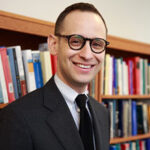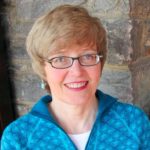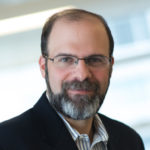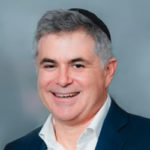Fall 2022 Tikvah Advanced Institutes
 Christian Zionism: Past, Present, and Future
Christian Zionism: Past, Present, and Future
with Sam Goldman, George Washington University
7:00-8:30PM ET on Wednesday Nov. 9, Nov. 16, Nov. 30, Dec. 7, and Dec. 21
We will be joined by special guests Walter Russell Mead, Gavin D’Costa, Gerald McDermott, and Robert Nicholson.
The course will explore the religious, political, and historical relationship between Christianity and Zionism. Can Christians be Zionists? How have Christian movements and ideas interacted with Zionism? The course considers a range of theological sources and historical periods, but pays special attention to the role of Christian supporters of Zionism and the State of Israel in determining American foreign policy. Is “Christian Zionism” a 20th-century phenomenon, concentrated among evangelical Protestants on the Right? Or an older tradition with more varied political expressions?
Samuel Goldman is an associate professor of political science at George Washington University, where he is also executive director of the John L. Loeb, Jr. Institute for Religious Freedom and director of the Politics & Values Program. His first book God’s Country: Christian Zionism in America was published by the University of Pennsylvania Press in 2018. His next book, After Nationalism was published in Spring 2021. Goldman received his Ph.D. from Harvard and taught at Harvard and Princeton before coming to GW. In addition to his academic work, Goldman is a national correspondent at The Week and a contributing editor at The American Conservative. His writing has appeared in The New York Times, The Wall Street Journal, and many other publications.
 African American Political Thought
African American Political Thought
with Diana Schaub, Loyola University Maryland
7:00-9:00PM ET on Monday, Nov. 14, Nov. 21, Nov. 28, Dec. 5, and Dec. 12.
Led by political science Professor Diana Schaub, this course will examine the writings of those African Americans who have reflected most profoundly on the American regime and their place in it, from the time of the nation’s founding to the present. We will study the writings of prominent thinkers such as Frederick Douglass, Booker T. Washington, James Baldwin, Martin Luther King, Malcom X, and more. We will discover the multifaceted character of America’s political history, and how the political tradition of Black Americans has made an indelible impression on that history.
Diana Schaub, a New Atlantis contributing editor, is a professor of political science at Loyola University Maryland and a visiting scholar at the American Enterprise Institute. In 2001, she was the recipient of the Richard M. Weaver Prize for Scholarly Letters. From 2004 to 2009 she was a member of the President’s Council on Bioethics. She is the author of Erotic Liberalism: Women and Revolution in Montesquieu’s Persian Letters, along with a number of book chapters and articles in the fields of political philosophy and American political thought. She is also a co-editor (with Amy and Leon Kass) of What So Proudly We Hail: The American Soul in Story, Speech, and Song. From 1994 to 1995 Ms. Schaub was the postdoctoral fellow of the Program on Constitutional Government at Harvard University. She has taught at the University of Michigan at Dearborn and served as assistant editor of The National Interest. She earned an A.B. from Kenyon College, where she was elected to Phi Beta Kappa, and an M.A. and Ph.D. from the University of Chicago.
 Federalism and the Future of American Conservatism
Federalism and the Future of American Conservatism
with Eric Cohen, Tikvah Fund
6:30-8:00PM ET on Thursday, Nov. 10, Nov. 17, Dec. 1, Dec. 8, and Dec. 15.
We will be joined by special guests Christopher DeMuth, Yuval Levin, Harry Ballan, and Adam White.
From the earliest days of the American experiment, our colonies and states had distinctive cultures and a significant sphere of political autonomy. The idea of federalism was central to the American system of government: a way to preserve localism and pluralism within a national democratic republic. Led by Tikvah CEO Eric Cohen, this seminar will explore the political theory behind American federalism and the history of federalism from the colonial period to the modern era.
We will discuss the biblical and philosophical roots of this idea; the debates between “Federalists” and “Anti-Federalists”; the fracture that led to the Civil War; the amendments to the Constitution that reshaped our federalist republic; the divides between “states’ rights” and national progressivism; the expansion of the federal government from the New Deal to the Great Society; and the role of the judiciary in shaping the relationship between state government and national government, including momentous recent Court decisions such as Dobbs. Are we living in an age when red states are becoming redder and blue states are becoming bluer? Is America a stronger or weaker nation if state identities and state-level social policies diverge? Is a true federalism even possible, given the homogenizing influence of technology, media, economic life, and the national welfare state? What is the relationship between “national conservatism” and “federalist conservatism”? And do Jews have any special stake in the renewal of federalism today?
 First to Knock, First Admitted: Jewish Theology and Literature in Postwar America
First to Knock, First Admitted: Jewish Theology and Literature in Postwar America
with Abe Socher, Jewish Review of Books
10:00–11:30AM ET on Sunday, Nov. 13, Nov. 20, Dec. 4, Dec. 11, and Dec. 18.
Led by editor of the Jewish Review of Books and intellectual historian Abraham Socher, this seminar will focus on one of the greatest bursts of literary and intellectual activity in diaspora history. In literature this is often said to begin with Saul Bellow’s novel The Adventures of Augie March: “I am an American, Chicago born. . . and will make the record in my own way: first to knock, first admitted; sometimes an innocent knock sometimes a not so innocent.” Other early 1950s classics which laid the Jewish claim to America include Heschel’s The Sabbath: its Meaning for Modern Man, and Will Herberg’s Protestant, Catholic, Jew: An Essay in American Religious Sociology. These works will be read and discussed along with thinkers and writers from Irving Kristol and Philip Roth to Rabbi Joseph Soloveitchik and the Lubavitcher Rebbe, all of whom helped to inaugurate an almost golden era of postwar American Jewish culture, which is now, arguably, at its end.
Abraham Socher was educated at UCLA, Harvard University, the Hebrew University (where he was a Fulbright Fellow) and UC Berkeley, where he received a PhD in History. Most recently, he is the author of Liberal and Illiberal Arts: Essays (Mostly Jewish) (Paul Dry Books, 2022), which has been shortlisted for the new Rabbi Jonathan Sacks Book Prize. His edition of the Jewish Enlightenment classic The Autobiography of Solomon Maimon (Princeton University Press, 2019) was a National Jewish Book Award Finalist. Socher was, for many years, a professor at Oberlin College where he chaired the Jewish Studies program. His essays have appeared in, among other journals, Commentary, The Chronicle of Higher Education, The Times Literary Supplement (TLS), the Wall Street Journal, and the magazine he founded and continues to edit, the Jewish Review of Books.